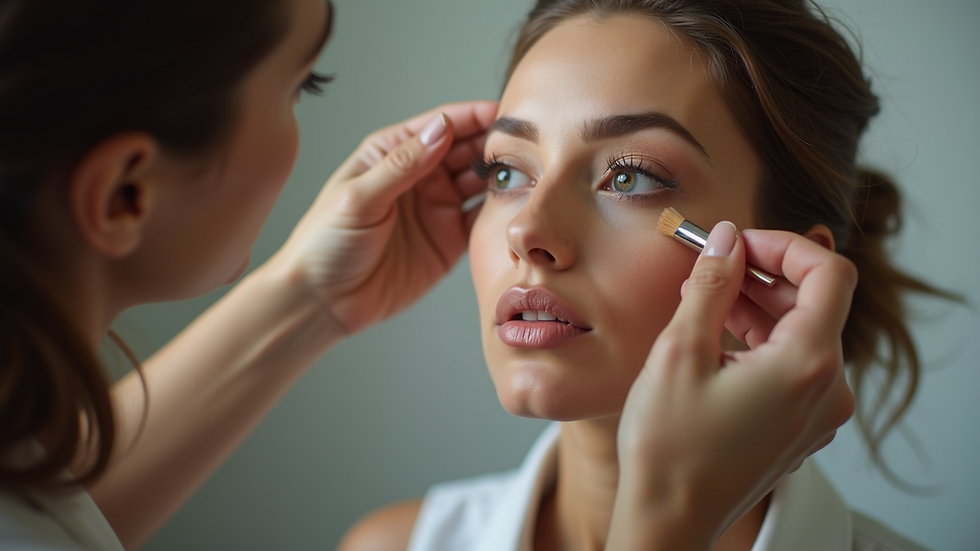How Digital Platforms Are Changing Beauty Education
- Evelyn Randhawa
- Apr 19
- 3 min read
The beauty industry is evolving at a rapid pace, driven largely by digital platforms that are transforming not just how products are marketed and sold, but also how education is delivered. With the rise of online learning, aspiring beauty professionals can now access a wealth of resources from the comfort of their homes. This blog post explores the impact of digital platforms on beauty education, highlighting the advantages of online courses, the importance of continued education, and the best courses available today.

The Rise of Online Makeup Learning
The shift to online makeup education was expedited during the COVID-19 pandemic, which revealed the potential of distance learning. Traditional classrooms couldn't sustain the demand and engagement required, leading many educators to pivot to digital platforms. This transition freed students from geographic limitations and allowed access to courses featuring diverse expert instructors from around the globe.
A report from Global Market Insights suggests that the online education market will surpass $375 billion by 2026, showcasing the growing preference for remote learning. Many students now favor online courses due to their flexibility and convenience, which are especially appealing for those balancing jobs or family responsibilities.

Advantages of Digital Platforms for Beauty Education
Digital platforms provide a myriad of benefits for beauty education, including:
Accessibility: Students can attend classes from anywhere, whether they are in a bustling city or a rural area. This opens opportunities for many who may not have access to physical beauty schools.
Affordability: Online courses generally cost less than in-person classes since they eliminate overhead associated with facilities and materials. This makes professional training more affordable.
Self-paced Learning: Unlike traditional classes with fixed schedules, online courses allow students to learn at their own pace. This flexibility enables learners to spend extra time on difficult concepts without the pressure of keeping up with peers.
Diverse Offerings: Digital platforms often feature a broader range of courses, allowing students to specialize in different areas of makeup artistry like special effects, bridal makeup, or skincare science.
Community Engagement: Many online platforms foster an active community environment, where students can connect, collaborate, and share their work. This interaction can provide valuable feedback and motivation.

Which Course is Best for Makeup Artists?
When considering an online makeup artistry course, it's crucial to evaluate what aligns best with your goals and aspirations. Key factors include:
Curriculum: Look for comprehensive programs that cover essential topics and techniques. Some courses focus on specific skills, while others offer broader training.
Certification: While informal channels exist, accredited programs offer recognized qualifications, which may be crucial for career advancement.
Instructor Experience: Research the background of your instructors. Those with industry experience or who have worked with reputable brands may provide valuable insights.
Reviews and Testimonials: Learning about the experiences of past students can offer insight into the course quality and effectiveness.
Practical Assessments: Courses that include hands-on projects or assessments will help develop and validate your skills.
A platform like Evelyn Randhawa Beauty is an excellent option for those looking to dive deeper into makeup artistry through its well-structured online makeup artistry course.
The Importance of Continued Education
The beauty industry is never stagnant; trends, techniques, and technologies are constantly changing. Continuing education through online platforms allows beauty professionals to stay updated.
Not only does this add value to their skill set, but it also enables them to navigate seasonal trends or adapt to new makeup styles and application techniques. For instance, the recent trend of clean beauty has encouraged many makeup artists to learn more about ingredient safety and product formulation.
Offering tailored education in response to industry demand is what sets the best online platforms apart. Many courses now integrate modules on current trends, sustainability, and social media marketing—a vital skill set for today’s beauty professionals who must promote their work online.
Conclusion: The Future of Beauty Education
The digital transformation of beauty education has made it more exciting and accessible than ever. With various platforms making learning flexible, affordable, and efficient, the future looks bright for emerging makeup artists.
As digital solutions continue to evolve, we can expect more innovation in content delivery and instructional methods, which will further enhance learning experiences.
Simply put, the beauty education landscape is thriving, driven by technological advances and the quest for continuous improvement. Whether you're looking to become a makeup artist or enhance your existing skills, embracing online learning could be the step that propels your career forward.
The world of makeup artistry is vast, and with the right tools—especially in today’s digital age—you can carve out your niche. So, what are you waiting for? Dive into the world of online education and unlock your potential!
.png)



Comments